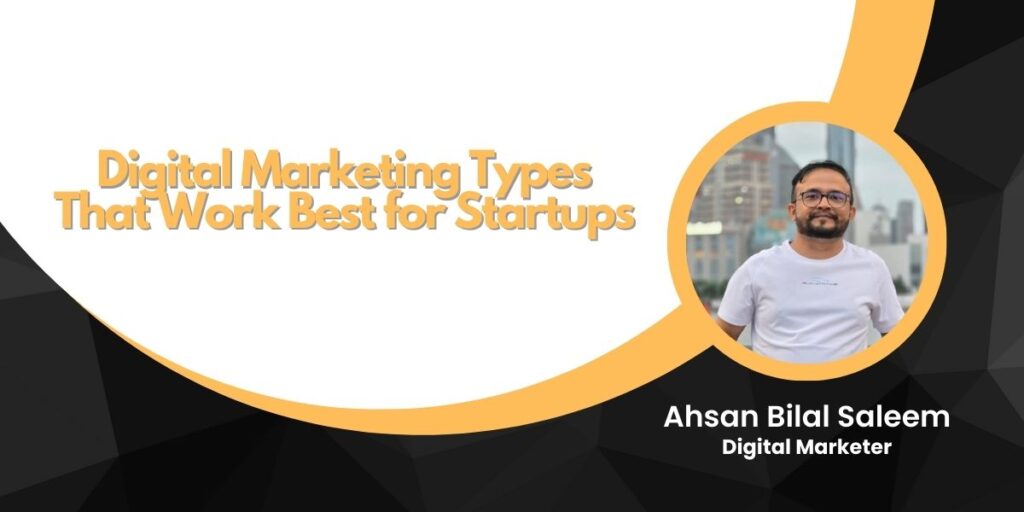Beginning a business is an invigorating yet testing venture. One of the biggest hurdles for startups is gaining visibility and building a customer base with limited resources. This is where computerized showcasing turns into a unique advantage. With the right strategies, startups can achieve remarkable growth without breaking the bank. Below, we explore the most effective digital marketing types for startups and why they work.
1. Content Marketing
Content marketing is one of the most cost-effective strategies for startups. By creating valuable, relevant, and engaging content, businesses can attract and retain a target audience. Examples include blogs, how-to guides, case studies, and infographics. Content marketing not only builds trust and authority but also boosts search engine rankings, leading to increased organic traffic.
Why it works for startups:
- Low-cost compared to paid advertising.
- Long-term benefits from evergreen content.
- Establishes the brand as an industry expert.
2. Social Media Marketing
Social media platforms like Instagram, Facebook, LinkedIn, and TikTok offer startups a direct line to their audience. These platforms allow businesses to showcase their products, share updates, and engage with customers in real-time. Organic posting combined with targeted social media ads can help startups reach a larger audience quickly.
Why it works for startups:
- Affordable and scalable campaigns.
- Provides real-time customer feedback.
- Helps build brand loyalty and community.
3. Search Engine Optimization (SEO)
SEO is essential for driving organic traffic to a startup’s website. By optimizing website content and structure for search engines, startups can improve their visibility on Google and other search engines. A solid SEO strategy includes keyword research, on-page optimization, and link building.
Why it works for startups:
- Cost-effective compared to PPC advertising.
- Drives long-term, sustainable traffic.
- Increases credibility with high search rankings.
4. Pay-Per-Click Advertising (PPC)
While organic strategies are vital, PPC advertising can provide an instant boost to a startup’s visibility. Platforms like Google Ads and social media ads allow businesses to target specific demographics, ensuring that their ads reach the right audience. PPC is particularly useful for promoting time-sensitive offers or launching new products.
Why it works for startups:
- Immediate results.
- Budget control with flexible spending.
- High targeting precision.
5. Email Marketing
Email marketing remains one of the most reliable forms of digital marketing. Startups can use email campaigns to nurture leads, announce new products, and share special offers. Building an email list early on provides startups with a direct communication channel to their audience.
Why it works for startups:
- Low cost with high ROI.
- Personalization increases engagement.
- Builds customer relationships over time.
6. Influencer Marketing
Collaborating with influencers can significantly amplify a startup’s reach. Micro-influencers, in particular, are often more affordable and have a highly engaged audience. They can promote your product or service authentically, helping to build trust among their followers.
Why it works for startups:
- Access to niche audiences.
- Boosts brand credibility through trusted voices.
- Drives quick awareness and conversions.
7. Affiliate Marketing
Affiliate marketing is a performance-based strategy where affiliates promote your products or services in exchange for a commission. This strategy reduces upfront costs and ensures that startups only pay for actual conversions.
Why it works for startups:
- Low-risk with high reward.
- Expands reach through affiliate networks.
- Encourages word-of-mouth marketing.
8. Video Marketing
Video content is highly engaging and versatile. Startups can use platforms like YouTube, Instagram Reels, and TikTok to showcase product demos, share customer testimonials, or tell their brand story. Video marketing is particularly effective for connecting emotionally with the audience.
Why it works for startups:
- High engagement rates.
- Increases retention of brand messaging.
- Enhances visibility across social platforms.
9. Local SEO and Google My Business (GMB)
For startups with a physical presence or localized service area, optimizing for local SEO is crucial. This includes setting up and maintaining a Google My Business profile, gathering customer reviews, and using location-based keywords.
Why it works for startups:
- Increases visibility in local searches.
- Attracts nearby customers.
- Builds trust with customer reviews.
10. Referral Marketing
Word-of-mouth is one of the most effective forms of marketing, and digital referral programs can amplify its impact. By boosting existing clients to allude new ones, new companies can develop their client base naturally.
Why it works for startups:
- Leverages satisfied customers as brand advocates.
- Cost-effective with high conversion rates.
- Encourages customer loyalty.
Conclusion
Startups have a plethora of digital marketing types to choose from, each with its unique benefits. By understanding their interest group and putting forth clear objectives, new businesses can focus on the systems that line up with their assets and goals. Whether it’s creating engaging content, leveraging social media, or investing in PPC, a well-executed digital marketing plan can propel a startup toward success.
